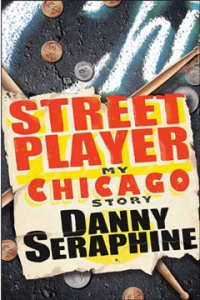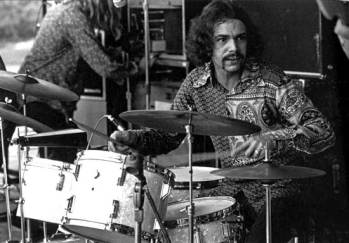Danny Seraphine, the bandChicago’s co-founder and drummer extraordinaire from 1967 to 1990, has written the first book by any current or former member about the 70s and 80s iconic band.
Seraphine, born in Chicago’s New Little Italy, received the bulk of his education on some of the toughest streets in the city. As a high school dropout, Seraphine had two choices in life: become a low-level, mafia street thug; or become a professional drummer.
His selection as a replacement drummer with Jimmy Ford and the Executives introduced Seraphine to future long time playing partners, saxophonist Walt Parazaider, and tragic guitar legend, Terry Kath. When their services in that band fell through, the three joined a local cover band called, the Missing Links. Eventual dissatisfaction with the type of music they were playing, as well as the shoddy performance venues they were forced to put up with, motivated them to form a new kind of horn band. This project would feature no “front man,” be 100% about the music, and be comprised of the best players they could find in Chicago. Membership in this new band of brothers, which was soon to known as the Big Thing, additionally included trumpeter Lee Loughnane, trombonist Jimmy Pankow, and piano/organist Robert Lamm.
After signing a management deal with James William Guercio, and also securing bassist Peter Cetera, the band made it’s way out to California. Renamed Chicago Transit Authority, then simply Chicago, the band endured many hardships before acquiring fame.
However, it could be strongly argued that Chicago’s toughest hardships occurred after they attained the success they longed for. As Seraphine describes – sometimes broadly, while at other times in great detail – the mental breakdowns, jealousies, infighting, physical altercations, infidelities, minor scandals, mismanagement, serial writer’s block, financial blunders, one band member’s defection, and the untimely death of their guitar genius all point to one major contributing factor: drugs.
I always wondered why there was never a book written by Chicago about Chicago, and now I have my answer: Who in the band would WANT their story told truthfully?! There are many sad and dark tales hidden behind that silk-screened, Coca-Cola lettered logo. It would be easy to condemn Seraphine (who was fired from the band for reasons that depend upon which side of the issue you ask) for writing this autobiography if it wasn’t for the fact that he seems to assign blame to himself as much as anyone else he writes about, and keeps all the who-had-affairs-with-whom discreetly out of his story, unless he is speaking about himself.
As much as I have admired Chicago, which goes as far back as when “Make Me Smile” and “25 Or 6 To 4” were new songs, my biggest gripe with the band has NEVER been about their inability to replace the irreplaceable Terry Kath. No, my beef involves how they switched from being the innovators of their craft to being the followers of trends, like the period immediately following Kath’s death (disco, and their fading use of quality horn arrangements). By the 1980s, Chicago was no longer simply following trends but rather chasing after them (drum programming, rock/power ballads, and little to sometimes no use of the horns)!
Sure, their musical performances from the very beginning of the band’s career have pushed the envelope at times (Walt Parazaider’s unique solo in “Movin’ On” from Chicago II comes to mind), and yes, I wish I had a dime for every time they said the words, “I don’t know,” in their lyrics. But the instrumentation, band and horn arrangements, vocal leads and harmonies, song and chord structuring, album production, and sheer drive (that they possessed at least once upon a time) made Chicago a fascinating, fantastically exciting band to listen to THAT DOES warrant inclusion into the Rock and Roll Hall of Fame!
Okay, okay – end of sermon.
Seraphine delivers here an intriguing retrospective about his time withChicago. Well written and possessing a good storytelling sense, this interesting look into the inner workings of a band that was never fully as respected as it should have been, makes Street Player an excellent read.

